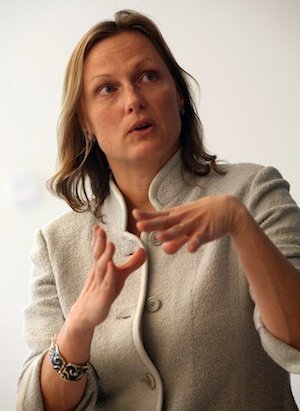Economist Amanda Bayer Develops Wiki to Attract Underrepresented Groups to Economics

Chronicle of Higher Education: A Wiki to Help Diversify a Discipline
A Swarthmore College professor has created a wiki for economists who want to make the field more welcoming to women and minority students.
"Imagine how much richer our profession might be, and even how different government policies might be, if more of our ranks were women or black or Latino or from some other underrepresented groups," says Amanda Bayer, an associate professor of economics at Swarthmore.
The wiki is called Div.E.Q., which stands for Diversifying Economic Quality, but is also a play on Diff EQ, or differential equations, a key course for economics majors. Ms. Bayer, who teaches a course called "Race, Ethnicity, and Gender in Economics," says the wiki suggests simple steps that professors can take to make sure that their own actions aren't dissuading women and minority students from becoming economics majors.
For example, it highlights the risk of "stereotype threat"-the theory that a person's performance is inhibited by prevalent stereotypes about a group to which the person belongs. Although few stereotype-threat studies have looked specifically at economics education, Ms. Bayer says the theory suggests that women and underrepresented minority students may underperform because economics is a field populated primarily by white men.
Div.E.Q. also provides links to studies that suggest that professors who lengthen the amount of time that they wait for answers after asking a question can elicit responses from a broader range of students, an approach that may benefit women and minority students.
"Many of us rush and call on the first hand that goes up," Ms. Bayer says. "The learning experience of speaking out loud will go to those who feel most confident."
While the underrepresentation of women in economics doesn't receive as much news-media attention as the paucity of women in mathematics, science, and engineering, the problem in economics is just as real. Among undergraduates earning bachelor's degrees in economics in the 2010-11 academic year, 31 percent were women and only about 11 percent were black or Hispanic, according to Ms. Bayer's wiki, which uses Education Department and National Science Foundation data. While women have made significant progress in the field, just 22 percent of tenured or tenure-track economists across all institutions in 2012 were women, according to the wiki. Only 5.6 percent of tenured or tenure-track economics professors were black or Hispanic.
A recent study led by Ann Mari May, an economics professor at the University of Nebraska at Lincoln, found that the underrepresentation of women in the profession may skew public-policy recommendations. The study found significant differences between male and female economists' views on issues like the minimum wage, labor standards, health insurance, and the gender-wage gap, with men generally preferring less government intervention.
"If we get a broader range of perspectives represented in our discipline, it will trickle down to many others," Ms. Bayer says.
The Consortium on High Achievement and Success, an alliance of liberal-arts colleges focused on minority-student success, provided Ms. Bayer with a grant to help start Div.E.Q. in 2011. The American Economic Association's Committee on the Status of Minority Groups in the Economics Profession endorsed the wiki in 2012, and will feature it at the AEA's annual meeting, in January. ...
Bayer joined Swarthmore's faculty in 1992. Her research interests include microeconomics, game theory, labor markets, and discrimination. Each year, she teaches a course, Race, Ethnicity, and Gender in Economics, in which she uses economic theory and statistical tools to analyze the sources of social and economic inequality and examines the roles of race, ethnicity, and gender in the development of economic theory and policy, evaluating economic models and government policies as products of economic and cultural environments.


